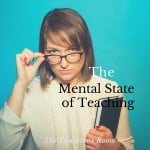Here in south Louisiana, we are recovering. The Cajuns are a strong, passionate people, and I assure you, we will come back stronger than ever. Thank you all for your thoughts and prayers. In the midst of tragedy, we discover who we are and what we believe, and we choose to believe in humanity and each other. As a teacher, the shooting a couple of weeks ago affected me deeply. I worry about the world we live and what is becoming of humanity. I worry about my students and how I would have felt if they had been in that theater that Thursday night because they are my kids too.
Tragedy happens every single day in the United States, it varies from social injustice to natural disasters; from moral dilemmas to terrorism. There is no escape from the reality of life, it is splashed all over the television and internet, and because of social media our teenagers are informed more than ever before due to Instagram and Facebook. Trending topics and hashtags from popular celebrities are keeping our teenagers aware of the world around them.
Tragedy gives us teachable moments in our classroom, however as teachers, it is important to be careful how it is discussed because our influence matters. On September 11, 2001, I was a student sitting in my high school chemistry class when our principal told us about the terrorist attack. My chemistry teacher and several others teachers were gathered in the hall trying to decide how much we needed to know. As the day processed, each of my teachers handled this event differently and shaped my own response. Some of my teachers refused to discuss it with us, others turned on the television, and I had one who voiced his opinion loud and clear. With the event in Lafayette, I wonder how I would have handled it in my classroom. I thought about what my teachers did and here is the list of things we might consider, especially for high school students, if a tragic event occurs during the school year.
1. Personal thoughts. We all have personal opinions about the world around us. Not everyone will agree with us and I can promise there will be a time you will have to physically bite your tongue when an opinion you completely disagree with is spoken in your classroom. I believe it is very important to keep your opinions to yourself. I know it is difficult. Besides living in a world of tragedy, we live in a world where people think teachers may brainwash students with personal opinions. Our job is to give students a voice and teach them how to voice that opinion through writing, research, or speaking, even if we completely disagree with it.
2. The source. I hope we all teach our students to use multiple sources and teach them how to avoid biased websites and organizations. In the face of tragedy, we also must remember to remind them that Instagram and a movie star’s opinion does not mean it should automatically be believed as truth. Being mindful about how to discern the facts a news station reports is an important skill we can teach our students.
3. The opposition. We must teach our students there can be many sides to every story, and not everything is as cut and dried as it may seem. Not all tragic events are handled the way we think they should have been. Teaching them to always consider other perspectives, even if they do not agree with them, is an important life skill. We must teach them to respect the opposite point of view from theirs and respond to it with grace.
4. Counselors. Teenagers are not fully developed creatures and hormones are always in flux. Please be aware sometimes a classroom discussion is not the best way to handle a tragedy. If the event was local and especially if it involved members of your school, please consider bringing in trained counselors to speak with students. Hopefully your school already has a plan in place to deal with situations like this. As teachers, we are not trained extensively in handling tragic events. Let a counselor guide students in the right direction.
5. An outlet. Your classroom could be a chance to escape the situation whether it is writing, art, or even playing basketball is exactly what they need. Teenagers are still kids. Seeing and talking about an event in every single class may not be the best way for them to process it. Emotions are running high and it may be more important to avoid a situation where students might get into an argument over an event they have no control over. At the same time, they may need a safe space to talk and discuss the events. We need to look at each class and decide: What do they need?
Tragedies are part of the human experience. As teachers, it is our job to not only teach English or Math, but to give students insight on how to handle life’s problems. We do need more training on how to handle such events because they are happening more and more. If you see a student that is particularly distressed, please contact the administration, counselor and the child’s parents.




